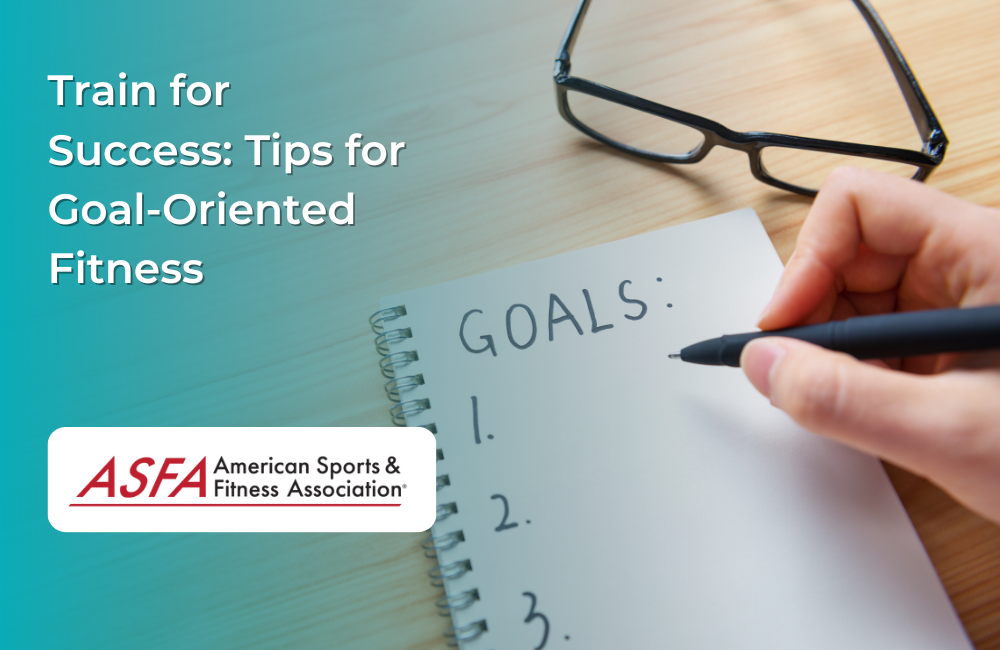
Train for Success: Tips for Goal-Oriented Fitness
Setting goals is an important part of achieving success in any area of life, including fitness. Whether you want to lose weight, build muscle, or improve your overall fitness level, having a clear goal in mind can help you stay motivated and focused on achieving your desired results. In this blog post, we will explore tips for goal-oriented fitness that can help you achieve success in your fitness journey.
Set Specific Goals
The first step in goal-oriented fitness is to set specific goals. Rather than simply saying you want to "get in shape," set specific goals such as losing 10 pounds, running a 5k race, or completing a certain number of push-ups. Having specific goals gives you a clear target to work towards and helps you measure your progress along the way.
Make Your Goals Realistic
While it is important to set ambitious goals, it is equally important to make sure they are realistic. Setting unrealistic goals can lead to frustration and disappointment, which can cause you to give up on your fitness journey altogether. Make sure your goals are achievable within a reasonable timeframe, given your current fitness level and lifestyle.
Write Down Your Goals
Writing down your goals can help make them more tangible and increase your commitment to achieving them. Write down your goals in a journal or on a piece of paper and keep them somewhere visible, such as on your fridge or bathroom mirror.
Break Your Goals Down into Smaller Steps
Breaking your goals down into smaller, more manageable steps can help make them feel less overwhelming and more achievable. For example, if your goal is to run a marathon, break it down into smaller steps such as running a 5k race, then a 10k race, then a half marathon, before ultimately reaching the full marathon.
Track Your Progress
Tracking your progress is important for staying motivated and measuring your success. Keep a workout log, take measurements, or use a fitness tracking app to track your progress towards your goals.
Hold Yourself Accountable
Hold yourself accountable for reaching your goals by setting deadlines and creating a plan of action. Share your goals with friends or family members who can offer support and accountability, or consider hiring a personal trainer or coach to help keep you on track.
Celebrate Your Successes
Celebrating your successes along the way can help keep you motivated and engaged in your fitness journey. Celebrate reaching smaller milestones, such as completing a new workout or hitting a new personal record, as well as larger milestones such as reaching your overall goal.
Adjust Your Goals as Needed
As you progress on your fitness journey, your goals may need to be adjusted to reflect your changing abilities and priorities. Don't be afraid to adjust your goals as needed, and always keep your ultimate goal in mind as you make these adjustments.
Create a Plan of Action
Creating a plan of action can help you stay organized and focused on your goals. Create a workout schedule, plan your meals, and make sure you have the necessary equipment and resources to achieve your goals.
Find a Workout Partner or Support Group
Working out with a partner or joining a support group can help keep you motivated and accountable, as well as provide a sense of community and support.
Focus on Consistency
Consistency is key when it comes to achieving your fitness goals. Make sure you are consistent with your workouts, meal planning, and tracking your progress.
Find Activities You Enjoy
Finding physical activities that you enjoy can help make your fitness journey more enjoyable and sustainable. Try out different types of workouts and find what works best for you and your goals.
Don't Give Up
It is important to remember that setbacks and challenges are a natural part of any fitness journey. Don't give up on your goals if you experience a setback or a temporary lack of motivation. Use these challenges as an opportunity to learn and grow, and stay committed to achieving your desired results.
Celebrate Non-Scale Victories
While achieving a specific weight or body composition goal can be motivating, it is important to also celebrate non-scale victories such as increased energy, improved mood, and improved overall health and well-being.
Make Fitness a Lifestyle
Finally, make fitness a lifestyle rather than just a temporary goal. Incorporate physical activity and healthy eating habits into your daily routine, and focus on long-term health and wellness rather than just short-term results.
In conclusion, goal-oriented fitness can help you achieve success in your fitness journey by providing a clear target to work towards and a plan of action to achieve it. Setting specific, realistic goals, tracking your progress, and celebrating your successes are important components of goal-oriented fitness. Remember to stay consistent, find activities you enjoy, and make fitness a lifestyle for long-term health and wellness. With dedication and hard work, you can achieve your fitness goals and live a healthy, active life.




